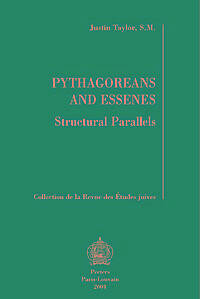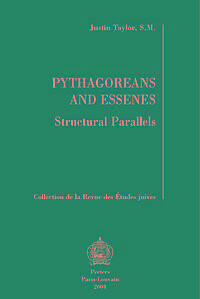
- Afhalen na 1 uur in een winkel met voorraad
- Gratis thuislevering in België vanaf € 30
- Ruim aanbod met 7 miljoen producten
- Afhalen na 1 uur in een winkel met voorraad
- Gratis thuislevering in België vanaf € 30
- Ruim aanbod met 7 miljoen producten
Zoeken
Omschrijving
This study attempts to answer the question of the origins of the non-biblical features of the Essenes' way of life. It is clear that their project was founded in biblical and Jewish realities. Whence came those elements that appear not to have been derived from these sources? That they have their origins in Greek, and specifically Pythagorean, customs is an idea that recurs regularly in the history of scholarship and has had some notable supporters in the 19th and first half of the 20th centuries, including Ed. Zeller, E. Schurer, I. Levy, F.C. Cumont and M.J. Lagrange. Recent scholars seem more reluctant to accept such views. The inquiry will take the reader through the available sources, then a series of comparative studies with possible parallels in Greece and elsewhere, to see whether and in what terms the question of Pythagorean influences on Essenism can be answered.
Specificaties
Betrokkenen
- Auteur(s):
- Uitgeverij:
Inhoud
- Aantal bladzijden:
- 127
- Taal:
- Nederlands
- Reeks:
Eigenschappen
- Productcode (EAN):
- 9789042914827
- Verschijningsdatum:
- 16/11/2004
- Uitvoering:
- Hardcover
- Formaat:
- Trade paperback (VS)
- Afmetingen:
- 162 mm x 245 mm
- Gewicht:
- 267 g

Alleen bij Standaard Boekhandel
+ 120 punten op je klantenkaart van Standaard Boekhandel
Beoordelingen
We publiceren alleen reviews die voldoen aan de voorwaarden voor reviews. Bekijk onze voorwaarden voor reviews.











